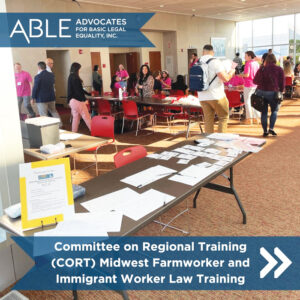 Toledo, OH, May 21, 2024—For more than 50 years, Advocates for Basic Legal Equality, Inc. (ABLE) has been fighting for and advocating alongside agricultural workers across the state by providing vital legal services and educational programs to agricultural workers, who often face significant barriers to justice. ABLE’s work includes advocating for fair labor practices, combating exploitation, and ensuring safe working conditions for these essential workers. Through litigation, policy advocacy, and community education, ABLE empowers agricultural workers to understand and assert their legal rights. Their efforts address issues such as wage theft, unsafe housing, and discrimination, ultimately contributing to more equitable and just conditions within the agricultural sector.
Toledo, OH, May 21, 2024—For more than 50 years, Advocates for Basic Legal Equality, Inc. (ABLE) has been fighting for and advocating alongside agricultural workers across the state by providing vital legal services and educational programs to agricultural workers, who often face significant barriers to justice. ABLE’s work includes advocating for fair labor practices, combating exploitation, and ensuring safe working conditions for these essential workers. Through litigation, policy advocacy, and community education, ABLE empowers agricultural workers to understand and assert their legal rights. Their efforts address issues such as wage theft, unsafe housing, and discrimination, ultimately contributing to more equitable and just conditions within the agricultural sector.
Over the decades, ABLE has collaborated with other organizations and groups focusing on immigrants and agricultural workers, including the American Immigration Council, the Farm Labor Organizing Committee, AFL-CIO (FLOC), Immigrant Worker Project, and Justice for Migrant Women. ABLE has a reputation and track record for effectively advocating and addressing the community and legal needs of this special population.
Each year, ABLE participates in the Committee on Regional Training (CORT) Midwest Farmworker and Immigrant Worker Law Training, a conference where farmworker and immigrant worker legal services programs throughout the Midwest collaborate to present an in-person training for legal professionals. The training is designed for seasonal staff who will be working with migrant and immigrant workers over the summer. This year’s CORT conference is organized by ABLE, along with community partners Welcome Toledo-Lucas County and the Toledo-Lucas County Public Library (TLCPL). It takes place in Toledo from May 21-23, 2024, in the McMaster Center at the TLCPL Main Branch.
The 3-day training is spearheaded by ABLE Senior Attorney Mark Heller, who has planned out a full itinerary of informative and interactive panels, workshops, and speakers. “We’re expecting more than 70 people, including national-level folks, to train and participate in this week’s CORT training, which is held in Toledo once every three years,” Heller said. “Some of the panel discussions scheduled in this year’s training are the first of its kind.”
This includes a panel titled “Talking and Listening to Workers,” in which ABLE paralegals Wendy Aviña and Arturo Ortiz will join panelists Jose Rosas from Farmworker Legal Services and Mario Solis from Southern Minnesota Regional Legal Services to provide key tips for talking and listening to workers on outreach and other forums and answer questions and topics generated by the audience.
“This is one of the best trainings on farmworker law I have attended, and I’m excited to be a panelist,” Aviña said. “I am also looking forward to seeing our friends from across the Midwest!”
Because the goal is to train summer staff wherever they may be in their advocacy journeys, the emphasis is on training attendees to “issue spot” on a variety of issues affecting migrant and seasonal farmworkers, including agricultural employment, labor camp housing, health and safety, access to public benefits, and immigration issues. The training gives newer permanent staff an introduction to the various legal issues that the farmworker and immigrant worker populations face. It also serves as a refresher and update to provide opportunities for more experienced attorneys, advocates, and trainers to discuss emerging issues and best practices.
A thorough list of topics covered at the training include:
- Farmworker and Immigrant Worker Clients and Laws
- Sexual Harassment, Sexual Violence, and Trauma-Informed Advocacy
- AWPA: Migrant and Seasonal Agricultural Worker Protection Act
- Immigration Basics and Remedies for Victims of Crimes
- Deferred Action in Labor Enforcement (DALE)
- H-2A Program
- Farmworker Wages: Fair Labor Standards Act, State Claims, Adverse Effect Wage Rate (AEWR) and Prevailing Wages
- Farmworker Housing
- Health and Safety: Field Sanitation, Pesticides, and Workplace Injuries
- Outreach to Farmworkers and Immigrant Workers
“Our CORT training includes some of the best immigrant litigation attorneys in the country,” said Heller. “There’s tremendous work and progress addressing the legal needs of farmworkers throughout the Midwest, and ABLE is pleased to continue to be a leader in this impactful work.”
About Advocates for Basic Legal Equality, Inc. (ABLE) ABLE is a non-profit regional law firm that provides high quality legal assistance in civil matters to help eligible low-income individuals and groups in western Ohio achieve self-reliance, equal justice, and economic opportunity. Learn more at: https://www.ablelaw.org.

